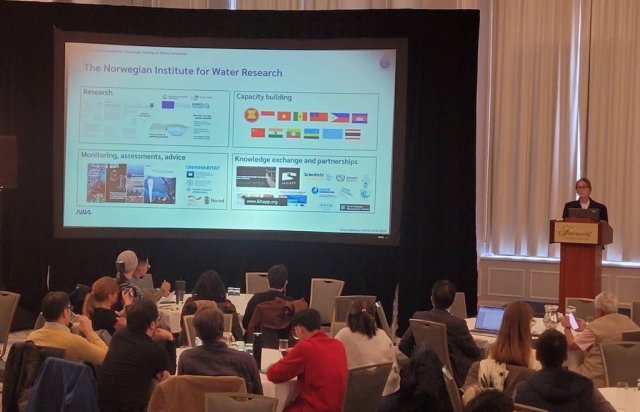
A (small) step closer to ending plastic pollution
UN Member States met in Ottawa 23-29 April to continue the negotiations for a global treaty to end plastic pollution. Researchers from NIVA are part of a network of 350 scientists informing the negotiations.
At the end of this year, the world may get an international agreement against plastic pollution. The negotiations that just ended in Ottawa may impact issues like how much and what kind of plastics can be put on national and international markets.
Christoffer Grønstad, project manager at NIVA, was present in Ottawa all week as an observer and as head of the IKHAPP-/NIVA-hosted Secretariat of the Scientists’ Coalition for an Effective Plastics Treaty.
In the first round of plastics treaty negotiations in Uruguay in 2022, only five scientists from the Scientists’ Coalition participated. The Coalition’s presence and influence have increased substantially since then, and a record 60 members of the Scientists’ Coalition participated in Ottawa.
Many delegations present in Ottawa expressed the need for the best available science to guide these negotiations.
- There is a clear demand for independent science to inform the negotiations. In particular, small delegations from developing countries need the support of the scientists to better assess different proposals for the treaty text, says Christoffer.
Members of the Scientists’ Coalition present in Ottawa have had countless meetings and interactions with such small delegations, as well as with European and other Western delegations.
Just transition
In addition to meetings with Member States and delegations, members of the Scientists’ Coalition also presented at seminars and similar events organized by the UN and other stakeholders.
For example, Emmy Nøklebye, researcher in NIVA’s section for International Environment and Development, gave a presentation linking NIVA’s international research collaborations in Asia to the plastics treaty discussions on just transition and extended producer responsibility.
- The Plastics Treaty must ensure a just transition for communities disproportionately affected by plastic pollution, says Emmy. She emphasises the importance of safeguarding human and workers' rights and ensuring fair and meaningful participation when crafting solutions to end plastic pollution.
In her presentation, Emmy highlighted NIVA’s capacity building projects in Asia. These provide relevant policy insights on how just transition and extended producer responsibility can be implemented in waste economies that rely heavily on informal workers like waste pickers.

Still far from an agreement
The starting point for the week-long negotiations was a 70-page «Zero Draft» of what will become the global treaty.
A large proportion of the week was spent streamlining this text and negotiating parts of it line by line.
Despite very long days (and nights), much remains unclear, especially when it comes to how ambitious the global treaty should be. There are still several thousand passages of text that it will be difficult to agree on within the deadline for the negotiations, which is set at the end of this year.
Sensitive issues include whether the agreement should set quantified targets (for example for reduced production of plastics), whether it should bar certain products from entering the market, and whether health criteria and the different types of microplastics, nanoplastics, and chemicals used in plastic products should be central elements of the agreement.
Many hours were also spent discussing procedures. One step in the right direction was made when agreement was reached on intersessional work, something that the parties have not managed to agree on in earlier sessions. Also, chair of the negotiations process, Ambassador Luis Vayas Valdivieso, promised that observers will be included in the intersessional work before the final round of negotiations in South Korea in November.
NIVA projects and scientists inform the negotiations
Norway has played an important role in the negotiation process (see article in Norwegian). NIVA’s participation is made possible through the projects PlasticTreaty (financed by Norad) and INOPOL (financed by the Norwegian Embassy in New Delhi).
NIVA’s role as host of the secretariat of the Scientists’ Coalition for an Effective Plastics Treaty is also facilitated by the PlasticTreaty project.
 Emmy Falk Nøklebye
Emmy Falk Nøklebye
 Christoffer Grønstad
Christoffer Grønstad